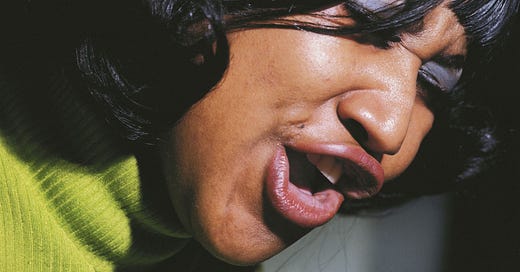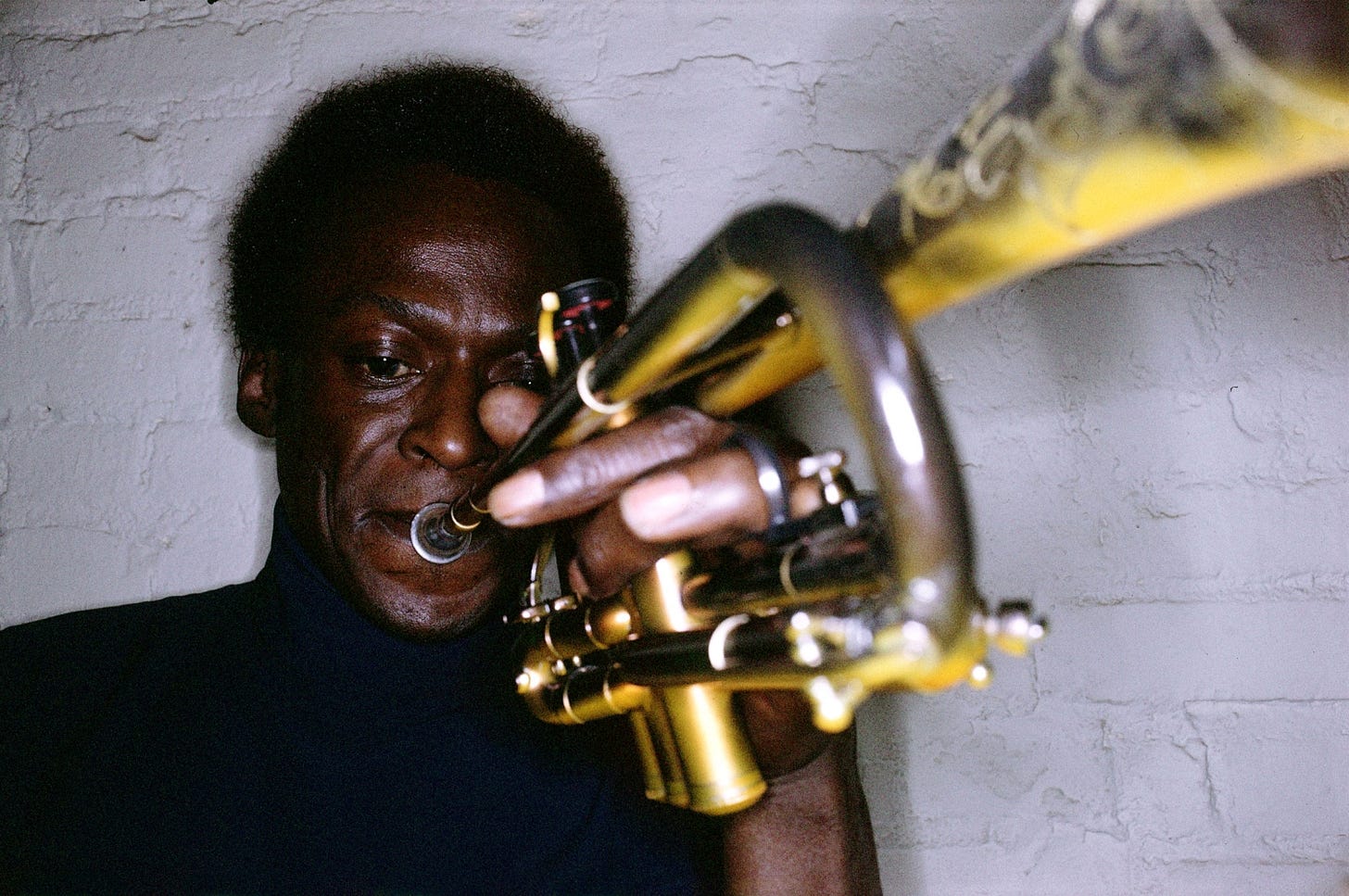Idealism, Independence, American Music // 2022 Music Favorites (So Far)
Immigrant thoughts this July 4th, featuring Wadada Leo Smith and Lee Friedlander's 'American Musicians' + a list of albums-tracks-shows-books for the first half-year
I recently re-started therapy, part of the process of a road back to presence. One of my initial breakthroughs has been to examine an immigrant idealization of America that continues to weigh heavier on me than it should at this point. Too often, the emo-Russian-boy-all-grown-up ashamedly feels, way down inside, that Santa Claus is real. Whereas the adult who studies and writes about American culture, and reads the news every day, understands the scene pretty clearly. So maybe it’s not a surprise that the tension between American Dream and American Hypocrisy comes up all the time in artist interviews on any number of related or unrelated topics. In fact, it came up recently in a conversation with Wadada Leo Smith, as he was discussing capitalization and profitability of America’s National Parks, which were the inspirations of some beautiful music he released in 2016.
“When you live in a capitalist society, in a capitalist world, it is virtually impossible for anything to not be capitalized,” Wadada told me. “It's impossible to escape. Except there is one route out, and that route is that you don't have to believe it. You don't have to endorse it. You can participate in it. You can take their money and you can run and put it in the bank and do whatever you wanna do with it. Produce your projects, everything. But if you don't believe in the system and you see yourself as just one who is using this system, because it's using you, you have struck a perfect balance. You see?” When I told him that, yes I saw that clearly but that that as an immigrant I was actually having trouble distinguishing between the dream of independence I arrived with, and the ensuing reality, Wadada doubled down metaphorically: “And that's why they call it a dream. There is no America, it's all a dream. And there's no Russia and there's no France. They all are dreams, dreams for the people that live in those countries. But not for the people that run and control them — for them, it's paradise.”
These are needful reminders. Yet there is a part of my adult life in which I continue to engage the residue of that Dream, and where I dare say it continues to play out forthrightly. It’s a layer of the Dream I first heard as a boy in Leningrad, before I knew it was a part of it, and which I’ve since recognized as both a complicated legacy of American history and the greatest single thing this country’s citizenry has ever offered the rest of the world. American Music. It of course begins with Black American music — the blues and its cousin “jazz” — and all the innovations that these sounds and their creators introduced to my deeply European mind-set: various ideas of freedoms (thematic, sonic, human, imaginative), new rhythmic structures and their constant reinventions, relating to music beyond aesthetics, as a tool of the community. Whatever other people’s notions of America’s soul or its dreaming or its idealized form of itself, mine continues to be wrapped in what America sounded like before I got here. Which is, in turn, directly related to what it sounds like now; and how American musicians, playing in a variety of traditions indebted to that Black American music which began to spread following the civil war and reconstruction (when Black Americans were first “freed”), continue to be some of the nation’s greatest voices.
Lee Friedlander’s book ‘American Musicians,’ also currently a photo show at Luhring Augustine in Tribeca (through mid-August), features the images of a couple of musicians whose voices I first heard and internalized as that young boy in Leningrad. Louis Armstrong and Ella Fitzgerald. Already, they were some of the greatest Americans — but besides knowing that they were Black, to me they mostly lived outside of history and borders, a figment of sonic imagination come to life, visiting from another dimension to introduce a world that could never again be forgotten. (There was later delight at hearing Armstrong’s oft-told tall-tale that he was born on July 4th, 1900 — another misdirection I believed far longer than I should.) Friedlander’s book and show has images of other musicians who expanded mine and the world’s imagination: Aretha, Billie, Duke, Miles, Ornette, Trane. As a staff photographer at Atlantic Records in the 1950s and ‘60s, Friedlander had access to some of the country’s greatest-ever musicians, and took some iconic photos of them. The book’s title gathered them all under a shared flag, affirming the relationship between the stories of their music and the nation’s story of itself. The photographer was pimping for the Dream, both the one that’s part of the national brand, and the one that can sometimes be heard on the wind.
For hopefully obvious reasons, it’s kind of hard to look at the flag today, to say the word America without putting it in symbolic quotes. How does one ignore a country’s continuous slide towards Christian fascism, the way it drapes its violent past and future collapse in nationalist exceptionalism, while stripping away long-held rights and ignoring the widening gulf between those who have them and those who don’t? A lot of apps, I guess. I dunno. The whole “justice for all” thing has never more seemed like a fictitious plot-point. Yet American music is still there and it’s still tangible, and recognizable, and on its best nights, a beacon of hope and spirit that communicates a belief in a people’s redemption — if not here in this world, then in another. I am now learned enough to know that it’s a quality not exclusive to the sounds of this nation; but still fool enough to believe its effects around here may one day match the ideals of its founding document.
Listen to Wadada Leo Smith on Dada Strain Radio, ep. 8: Listening to an Elder. Visit Lee Friedlander: American Musicians at Luhring Augustine Gallery, Tribeca, Manhattan (through August 9th).
Best of 2022 (so far)
People ask about these things all the time, so, in the spirit of baseball, which treats July 4th as a midway point of the season, here’s a list of 2022 music-related new listening/reading/attending that have made an impression. Not complete, but guaranteed. Either alpha or chronological order.
ALBUMS: Albert Ayler, Revelations: The Complete ORTF 1970 Foundation Maeght Recordings // Anteloper, Pink Dolphins // Billy Woods, Aethiopes // Crackazat, Evergreen // Gavilan Rayna Russom, Trans Feminist Symphonic Music // Hermeto Pascoal e Grupo, Live at Planetário Da Gávea // Jeff Mills & the Zanza 22, Wonderland // Joel Ross, The Parable of the Poet // Kendrick Lamar, Mr. Morale & The Big Steppers // Mark Guiliana, Music For Doing // Rosa Brunello, Sounds Like Freedom // Rosalia, Motomami // Shane Cooper & Mabuta, Finish the Sun // 700 Bliss, Nothing to Declare.
SONGS: The AM, "Black Majik" // Anna Butters, “Doo Wop” // Anteloper, "Earthlings" // Jana Rush & DJ Paypal, "Lonely" // Jitwam, "Brooklyn Ballers (musclecars remix)" // KH, "Looking at Your Pager" // Waajeed feat. Frank Alowishus, “Our Time is Now”
SHOWS: Vijay Iyer+Linda May Han Oh+Tyshawn Sorey (Village Vanguard, January) // Aquiles Navarro + jaimie branch + Jason Nazary + Tcheser Holmes (San Pedro, February) // DJ Dex & Mark Flash (Nowadays, February) Rashaad Newsome's 'Assembly' (Park Ave Armory, March) // '32 Sounds' (dir. Sam Green, music by JD Samson) (BAM, March) // Olivia Rodrigo (Radio City Music Hall, April)
BOOKS: Ayana Contreras, Energy Never Dies: Afro-Optimism and Creativity in Chicago // Dan Charnas, Dilla Time: The Life and Afterlife of J Dilla, the Hip-Hop Producer Who Reinvented Rhythm





Good list! I put my own best of the half-year up here:
https://burningambulance.substack.com/p/half-year-roundup